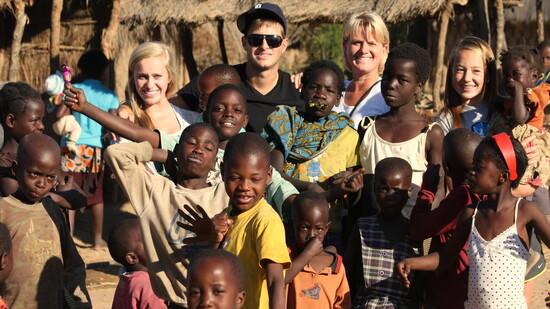There are moments in life when we’re forced to see—really see. Not just the obvious, not just the day-to-day, but something deeper. Something profound.
For Dr. Ann LaCroix Fredal of LaCroix Eye Care, that moment came when she stepped off a van in the dead of night, 26 travel-weary hours from home, and saw hundreds of people—men, women, children—sleeping on the ground, waiting for her.
And then, as if in some grand symphony of hope, the crowd stood up and cheered.
Optometry runs in Ann’s blood. Her father started the family practice in 1939, and she grew up peeking into exam rooms, watching him work with a mix of precision and warmth. But it wasn’t the eye itself that captured her imagination—it was the gift of sight, and the way that gift changed people’s lives.
So when her brother-in-law—a surgeon and co-founder of an eye clinic in Zambia—asked her to join an ongoing medical mission, she said yes. Not because it was easy. Not because she wasn’t afraid of the unknown. But because some calls in life demand an answer.
This was not a one-time mission trip. The clinic in Zambia was built to provide continuity of care, with medical teams rotating in every three months. Still, getting there was its own endurance test: flights, layovers, another flight, then an eight-hour drive through the darkness.
The morning after their arrival, the real work began. Patients who’d walked for days were lined up, waiting for their turn to see if Ann could help them. Most were completely blind from cataracts—easily treated in the U.S., but life-crippling in a place where medical care is scarce.
Ann’s role was to evaluate each patient, making sure anyone who underwent surgery had a chance to truly regain their sight. The stakes were high: they could only perform so many procedures. If an eye had too much damage, if disease had taken too great a hold, the surgery slot had to go to someone else.
The weight of that reality hit Ann hard. The first morning, she worked tirelessly, overwhelmed by the sheer volume of need. She stepped outside to take a breath—and suddenly broke down in tears. That’s when her brother-in-law found her. "You’re emotional," he observed.
"Yes, I’m emotional.” she replied. "This is crazy. These people have nothing. And they’ve walked for days just to be here."
But emotions couldn’t stop the work. Ann pressed on.
Some patients stood out in ways that were impossible to forget. A mother carried in her one-year-old child, desperately hoping for answers. Ann quickly realized the baby was blind—malaria had stolen its sight. She had to deliver the devastating news. The mother wept. Ann wept with her.
Then there were the moments of ingenuity, of unexpected triumph. Like the young boy who'd lost an eye to an injury a year earlier. He needed a prosthetic, but none of the glass eyes fit properly. The boy had walked for days to get there—there had to be a way.
And then, in a flash of brilliance, her husband Tom, a dentist, stepped forward. "I think I can fix this," he said. Using his dental tools, he carefully ground down the prosthetic, reshaping it until it fit. Tom’s ingenuity worked. The boy’s face lit up, his confidence restored. Ann and Tom placed a Michigan hat on the boy’s head—and they all celebrated together.
Ann made sure to make time for celebration, because every day was grueling.
"It sounds exotic—going to Africa—but this was difficult," Ann admits. "You're exhausted. You’re stressed. You're emotionally drained. But it’s exhilarating, too. You know you've done something that matters."
The hardest part was knowing that not everyone could be helped, that people who’d walked for miles, waited in the heat, had to hear that there weren’t enough hours, enough hands, enough resources to treat them all. Ann tries not to remember turning anyone away. Some memories, even the strongest minds refuse to hold.
Unlike one-off mission trips, her brother-in-law’s clinic continues its work, giving patients a place to return to for follow-up care. Still, there are challenges—limited supplies, unpredictable conditions, and the knowledge that for many, access to eye care remains an uphill battle. But the patients—joyful, grateful, and endlessly resilient—continue to make it all worth it.
Ann saw what true appreciation looks like: people who had nothing, who couldn’t see, who had no food, who’d walked for days on the chance that someone could help them see, stood in line singing, cheering, and believing in miracles that, more often than not, came true for them.
And in the end, Ann saw too—more than she ever expected.
"A mission trip," Ann reflects, "can be one of the most physically and emotionally exhausting experiences you will ever have. But it can also be one of the most rewarding and life-changing.”
It’s the kind of work that shakes you, drains you—and then, in an instant, fills you back up again. Because giving the gift of sight does more than just restore vision.
It restores hope.
Find Dr. Ann and her team at lacroixeyecare.com
International Vision Volunteers USA helps people in Africa get the eye care they need. At their clinic in Zimba, Zambia, volunteers provide thousands of eye exams and surgeries each year. The group isn’t connected to any religion and is funded by donations. Want to help? Learn more or give at ivvusa.org.
"It sounds exotic, but this was difficult. You're exhausted. You’re stressed. You're emotionally drained. But it’s exhilarating, too. You know you've done something that matters."
